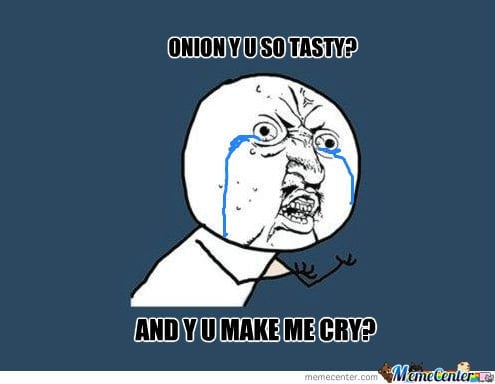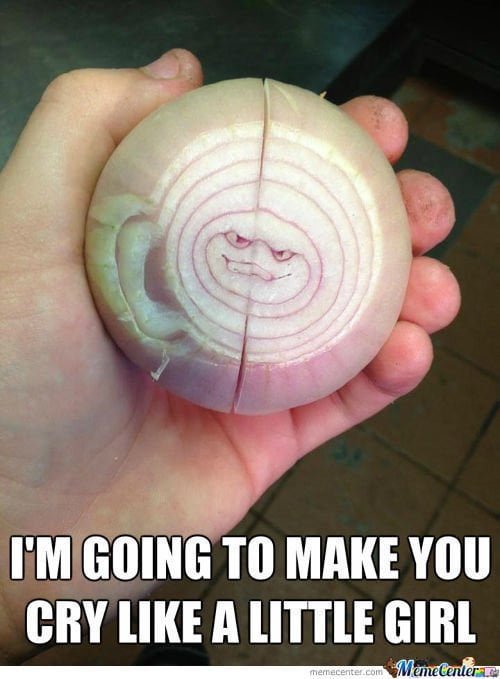Table of Contents (click to expand)
The reason onions make you cry is because they release a gas called syn-propanethial S-oxide. This gas reacts with the tears in your eyes to form sulfuric acid. The sulfuric acid is what causes the stinging sensation and the tears.
One of the worst parts about cooking is being subjected to the torture of Chopping Onions. That’s right. I capitalized it for the emphasis that it deserves. One minor cut into that evil vegetable can send even the strongest and staunchest people into a steady stream of uncontrollable tears. No matter how hard you try to prevent it, the onions will always get to you.
The question is… what is it about onions that immediately launches the waterworks in your eyes?

Recommended Video for you:
What Happens Inside The Onion
The automatic reaction that our bodies experience in the face of cutting an onion might almost make you believe in nature’s ability to create sorcery. In a way, it’s true, except that this “sorcery” we’re talking about is just pure chemistry.
Onions are neatly packed little stink bombs from hell. Alone, onions appear to be harmless, innocent vegetables, but once you cut them open, that changes pretty quickly.
“See, the onion is a perennial bulb that lives in the ground with lots of critters who are looking for a snack,” says Eric Block, the chemist who has written the book Garlic And Other Alliums, “so it has evolved a chemical defense system.”
Basically, the onion really really wants you to stop slicing it up.

The layers of the onion are also not just an accidental design flaw. They are actually quite ingenious! Within each onion cell, there’s a tiny glob — a sealed vacuole — filled with a synthase enzyme. This enzyme is basically the fuel for any and all of the onion’s mischief.
When you cut or bite into an onion, you’re basically tearing these cells apart, and opening up those previously tightly sealed vacuoles. By doing this, the synthase enzyme escapes its prison and is free to interact with the amino acid sulfoxides of the onion.
Separately, both chemicals – the enzyme and the amino acid sulfoxides – are pretty neutral. However, once combined, thanks to your brutal act of piercing the onion’s heart, they create sulfenic acid.
What Happens In Your Eyes
Sulfenic acid is a restless chemical that does not quietly concede to its new form. Because sulfenic acid is inherently unstable, many different chemical reactions occur in the onion within an instant. Finally, this onion chemical carnival results in sulfenic acid rearranging itself into syn-propanethial S-oxide.

The molecules of syn-propanethial S-oxide are lighter than air, so they waft up towards our unsuspecting eyes. Once they come into contact with the basal tears in our eyes, which already exist due to the lacrimal gland, they once again change their chemical nature. This time around, the chemical reaction results in a far more severe chemical being created – sulfuric acid.
Sulfuric acid, unsurprisingly enough, causes a strong stinging sensation in our eyes, namely because it poses a threat to our delicate cornea. The brain notices this external threat and signals the lacrimal gland to increase tear production. The industrious lacrimal gland upgrades the basal tears into reflex tears by stuffing them with antibodies, which fight any harmful incoming micro-organisms. The lacrimal gland typically ends up creating waaaaaay more tears than it needs to wash away the irritants.
Therefore, you’re left sobbing and sniffling and wondering if industrial-level safety eyewear might be worth investing in.

Solutions?
Of course, the simplest solution to this problem is cooking the bulb. By heating an onion, you basically inactivate the synthase enzyme. By debilitating the basic component of the chemical reaction, you successfully eliminate all chances of suffering an unprovoked emotional trauma.
There are, however, other ways to avoid these tears. You could choose a well-ventilated area for your battle against the onion. By dissipating the concentration of molecules of syn-propanethial S-oxide, you lower the chances of it invading your optical territory.
Another creative solution is to refrigerate the onions before chopping them. Molecules tend to move faster when they’re hot, and slower when they’re cold. By freezing or chilling the onions before cutting them, you significantly slow down their propensity to form harmful chemicals!

Of course, you could also just suck it up and deal with this peculiar effect of onions. After all, what is pleasure without any pain?












